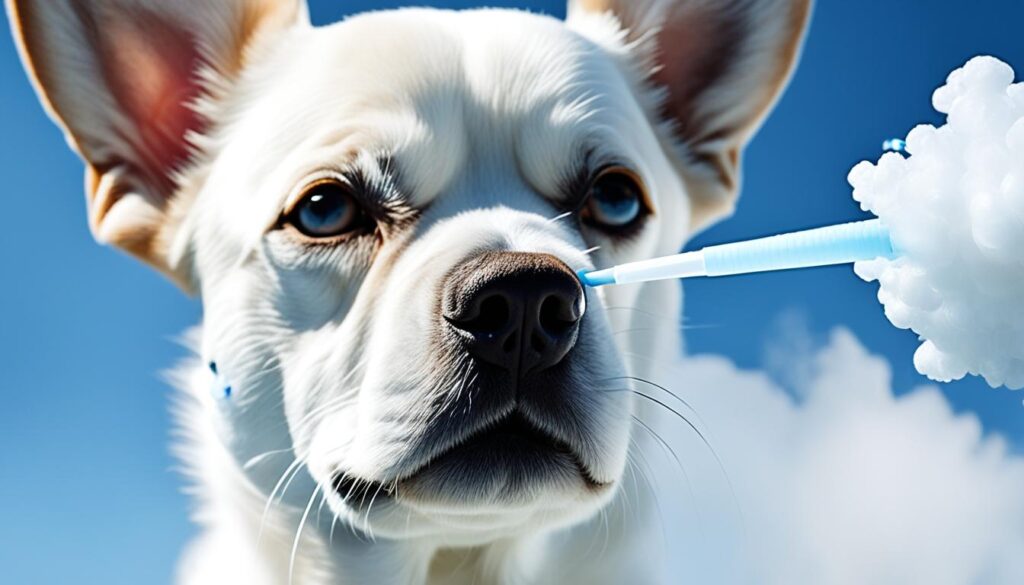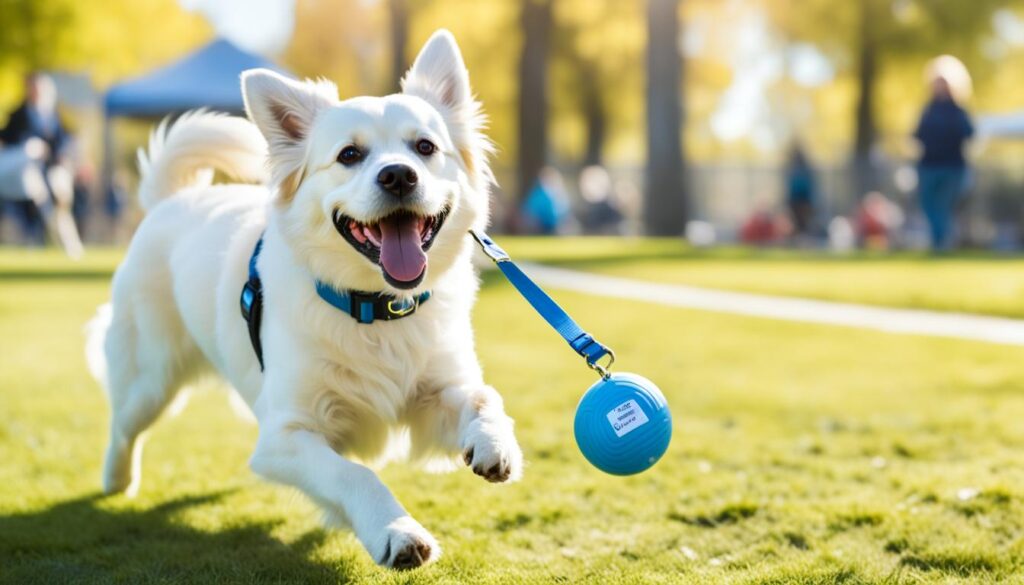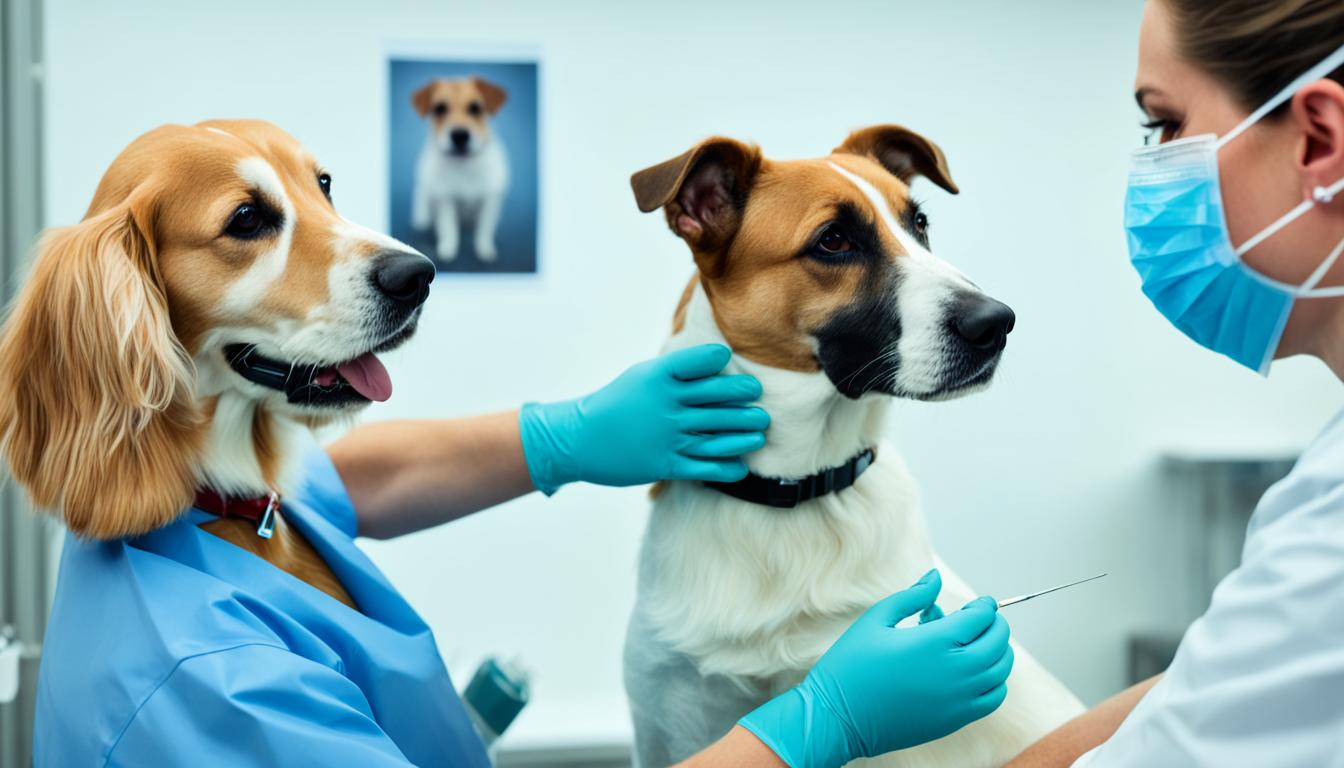Welcome to our comprehensive guide on pet vaccinations! As responsible pet owners, we understand the importance of ensuring our pets’ health and well-being. Vaccinations play a critical role in safeguarding our furry friends against various diseases and promoting their overall quality of life. In this guide, we will provide you with all the information you need to make informed decisions about your pet’s vaccination needs.
Proper pet care goes beyond regular meals and exercise. Vaccinations are a crucial aspect of preventive healthcare, helping to prevent the spread of infectious diseases and protecting our pets from potentially life-threatening illnesses. By staying up-to-date with vaccinations, we can provide our pets with a strong defense against harmful pathogens.
Throughout this guide, we will explore the core vaccinations recommended for dogs and delve into the importance of timely protection against diseases such as canine parvovirus, canine distemper, and hepatitis. We’ll also discuss non-core vaccinations, including those for bordetella, canine influenza, leptospirosis, and Lyme disease, which may be necessary depending on various factors such as location and lifestyle.
Furthermore, we’ll address the legal requirements surrounding rabies vaccinations and their implications for both pets and humans. We’ll also provide valuable tips on pet health and wellness, including natural remedies, nutrition guidance, and the importance of exercise in maintaining a well-rounded pet care routine.
If you’re a new puppy owner, we’ll cover everything you need to know about ensuring your furry bundle of joy receives the proper vaccinations at the right time. Additionally, we’ll explore the intersection of pet behavior and vaccination protocols, offering insights into making veterinary visits stress-free for our beloved companions.
Following vaccination, it’s important to adjust our pet’s exercise regime to support their recovery and mitigate any potential side effects. We’ll provide expert recommendations on post-vaccination exercise routines to ensure optimum health for our furry friends.
Finally, we’ll dive into the world of holistic pet health, discussing alternative approaches to pet vaccination and how they can complement traditional methods for comprehensive care.
We’re excited to share this valuable guide with you and empower you as a responsible pet owner. By making informed decisions about pet vaccinations and following recommended guidelines, we can provide our pets with the best possible protection and ensure their long and healthy lives.
Key Takeaways:
- Pet vaccinations are crucial for responsible owners in maintaining their pet’s health and well-being.
- Vaccinations play a vital role in preventing the spread of infectious diseases and protecting pets from life-threatening illnesses.
- Core vaccinations for dogs include protection against canine parvovirus, canine distemper, and hepatitis.
- Non-core vaccinations, such as bordetella, canine influenza, and vaccinations for leptospirosis and Lyme disease, may be necessary depending on location and lifestyle.
- Rabies vaccinations are not only essential for pet health but also legally required in many states.
The Importance of Vaccinations in Pet Care
Vaccinations are not only essential for the health and well-being of our beloved pets, but they also play a pivotal role in preventive healthcare. By providing protection against a range of infectious diseases, vaccinations serve as a vital safeguard, keeping our pets safe from potentially life-threatening illnesses.
One of the key aspects of preventive healthcare is disease prevention, and vaccinations are a powerful tool in achieving this objective. Vaccinations work by stimulating the immune system to recognize and fight specific diseases, thereby preventing the spread and severity of infections.
Without proper vaccination, pets are left vulnerable to diseases that can cause severe illness, long-term complications, and even death. By ensuring that our pets receive the necessary vaccinations, we significantly reduce their risk of contracting these diseases and enhance their overall quality of life.
Additionally, vaccinations contribute to the overall well-being of pets by providing a strong foundation for their health. Regular vaccinations help maintain a healthy immune system, which can improve their ability to fight off infections and reduce the impact of illnesses. Vaccinations also play a crucial role in preventing the transmission of diseases from pets to humans, protecting both the pet owner and the wider community.
As responsible pet owners, it is our duty to prioritize the health of our furry companions by ensuring they receive the appropriate vaccinations.
In the next section, we will focus on the core vaccinations that are essential for canine health. We will explore diseases such as canine parvovirus, canine distemper, and the role of hepatitis vaccines in protecting your dog. Understanding these core vaccinations will equip us with the knowledge needed to make informed decisions and provide optimal care for our canine friends.
Core Vaccinations for Canine Health
Ensuring the health and well-being of our beloved canine companions begins with proper vaccination. Core vaccinations play a vital role in safeguarding dogs from serious diseases that can be life-threatening. In this section, we will explore the importance of core vaccinations and their role in canine health.
Canine Parvovirus: The Fight Against a Deadly Disease
Canine parvovirus is a highly contagious and potentially deadly disease that primarily affects puppies and unvaccinated dogs. It can cause severe gastrointestinal symptoms, leading to dehydration and even death. Vaccination against canine parvovirus is crucial in preventing the spread of this disease and protecting our furry friends. The core vaccination for canine parvovirus is an essential step in ensuring the overall well-being of dogs.
Combating Canine Distemper with Timely Vaccination
Canine distemper is another serious viral disease that can affect dogs of all ages and is often fatal. It is highly contagious and can lead to respiratory issues, neurological problems, and even death. Timely vaccination is the most effective method to combat canine distemper and protect dogs from this devastating disease. Administering the core vaccination for canine distemper as part of a regular vaccination schedule is crucial for the long-term health of our furry companions.
The Role of Hepatitis Vaccines in Protecting Your Dog
Hepatitis in dogs, caused by the canine adenovirus, can result in liver damage and various associated health issues. Vaccination against hepatitis plays a vital role in protecting dogs from this contagious disease. By ensuring dogs receive the core vaccination for hepatitis, we can help safeguard their liver health and overall well-being. Hepatitis vaccines are a vital component of responsible pet care and are a key factor in preventing the transmission of this disease.
By recognizing the importance of core vaccinations for canine health, we can take proactive measures to protect our dogs from deadly diseases. Vaccinating against canine parvovirus, canine distemper, and hepatitis is essential in ensuring the longevity and well-being of our furry companions.
Navigating Non-Core Vaccinations for Dogs
In addition to core vaccinations, there are non-core vaccinations that may be necessary for certain dogs based on factors such as location and lifestyle. While these vaccinations are not universally recommended, they play a crucial role in protecting dogs from specific diseases. In this section, we will explore three important non-core vaccinations: bordetella vaccination, canine influenza, and vaccinations for leptospirosis and Lyme disease.
Assessing the Need for Bordetella Vaccination
Bordetella vaccination, also known as kennel cough vaccination, is important for dogs that are frequently in close contact with other dogs. This includes dogs that go to doggy daycares, boarding facilities, grooming salons, or participate in dog shows. Bordetella is highly contagious and spreads through the air, making it a common concern in areas with high dog population density. Vaccinating against bordetella can help protect your furry friend from this respiratory infection.

Canine Influenza: Understanding the Risks and Protections
Canine influenza, or dog flu, is a contagious respiratory disease caused by two types of canine influenza viruses. Just like human flu, it can spread easily and cause mild to severe illness in infected dogs. Although canine influenza may not be as widespread as other diseases, it is a concern in certain areas with reported outbreaks. Vaccination can help reduce the severity of symptoms and the risk of spreading the virus to other dogs.
Leptospirosis and Lyme Disease: Regional Vaccination Decisions
Leptospirosis and Lyme disease are both bacterial infections that can affect dogs. The risk of these diseases varies depending on the region and the prevalence of the bacteria in the environment. Leptospirosis is typically associated with stagnant water, while Lyme disease is primarily transmitted through ticks. If you live in or frequently visit an area where these diseases are common, vaccination may be recommended to protect your dog. Consult with your veterinarian to determine the necessity of these vaccinations based on your location and your dog’s exposure risks.
By understanding the importance of non-core vaccinations and considering the specific risks your dog may face, you can navigate these vaccination decisions effectively. Consult with your veterinarian to create a tailored vaccination plan that ensures your furry friend receives the right protection against preventable diseases.
Rabies Vaccination: Legal Requirements and Health Implications
In this section, we will discuss the importance of rabies vaccination for pets and the legal requirements that pet owners must adhere to. Rabies is a serious viral infection that affects the nervous system of mammals, including humans and pets. It is transmitted through the saliva of infected animals, most commonly through animal bites.
Rabies is a deadly disease that poses significant health risks to both pets and humans. Once symptoms appear, it is almost always fatal, making prevention through vaccination crucial. Rabies vaccination not only protects our beloved pets but also helps prevent the spread of the disease to humans.
In many states, rabies vaccination is a legal requirement for pet owners. By enforcing mandatory rabies vaccination, authorities aim to minimize the risk of rabies outbreaks and ensure public safety. Failure to comply with these legal requirements can result in penalties or legal consequences for pet owners.
It is essential for pet owners to understand and fulfill their legal obligations regarding rabies vaccination. This not only safeguards their pets’ health but also contributes to public health and safety. By vaccinating their pets against rabies, owners play a vital role in preventing the transmission of this dangerous disease in their communities.
Next, let’s explore the potential health implications of rabies and why it is crucial to vaccinate our pets against this deadly virus.
Pet Health and Wellness Tips
As responsible pet owners, we understand the importance of maintaining the health and wellness of our beloved pets. In addition to regular vaccinations and veterinary care, there are various other aspects of pet care that contribute to their overall well-being. In this section, we will provide you with some valuable tips and advice on how to keep your pet in optimal health.
Natural Pet Remedies and Their Place in Pet Care
When it comes to pet care, natural remedies can play a significant role in promoting their well-being. From soothing skin allergies to calming anxiety, there are several natural options available that can complement traditional veterinary treatments. However, it is crucial to consult with your veterinarian before incorporating any natural remedies into your pet’s care regimen to ensure their safety and effectiveness.

Integrating Pet Nutrition Tips for a Balanced Diet
Nutrition is an essential aspect of pet care, and a well-balanced diet is key to their overall health and wellness. Here are some nutrition tips to help you ensure that your pet is getting the nutrients they need:
- Choose high-quality pet food that is appropriate for your pet’s age, size, and breed.
- Ensure that their diet includes a balance of protein, carbohydrates, fats, vitamins, and minerals.
- Avoid overfeeding and monitor portion sizes to maintain a healthy weight.
- Incorporate fresh fruits and vegetables into their diet as a source of additional vitamins and antioxidants.
- Provide clean and fresh water at all times to promote hydration.
Pet Exercise Tips
| Exercise Type | Benefits |
|---|---|
| Regular walks | Improves cardiovascular health and helps maintain a healthy weight. |
| Playtime with toys | Stimulates mental and physical activity, reducing boredom and anxiety. |
| Interactive games | Promotes bonding between you and your pet while providing exercise. |
| Obstacle courses | Enhances coordination, agility, and overall physical fitness. |
| Swimming | Low-impact exercise that is gentle on joints, ideal for older or injured pets. |
By incorporating these pet health tips into your daily routine, you can ensure that your furry friend enjoys a happy and healthy life. Remember, the holistic approach to pet care encompasses various aspects, including natural remedies, nutrition, and regular exercise. Your pet’s well-being depends on you, so make their health a priority.
Special Considerations for Puppy Vaccinations
When it comes to puppy vaccinations, timing is everything. Starting off on the right paw is crucial for ensuring the health and well-being of your furry companion. Responsible puppy care involves following a vaccination schedule specifically designed for young dogs. By adhering to this schedule, you can provide comprehensive protection for your puppy during their early stages of development.
Timing Your Puppy’s Vaccinations: Starting Off on the Right Paw
Timing is essential when it comes to puppy vaccinations. Young puppies have developing immune systems that need time to strengthen and respond effectively to vaccines. Vaccinating your puppy too early or too late can result in a suboptimal immune response and leave them vulnerable to diseases. It is recommended to consult with your veterinarian to establish the best timing for your puppy’s vaccinations, taking into account factors such as breed, health status, and local disease prevalence.
Puppy Vaccination Schedule: Key Milestones to Remember
A well-structured vaccination schedule ensures that your puppy receives the necessary vaccines at the right time. The specific schedule may vary depending on various factors, but there are key milestones to keep in mind:
- 6-8 Weeks: Begin vaccinations with the core vaccines, which typically include vaccines for canine distemper, canine parvovirus, and canine adenovirus (hepatitis).
- 10-12 Weeks: Administer the second round of core vaccines to boost their immunity and provide continued protection.
- 14-16 Weeks: Complete the core vaccine series with the final round of shots, ensuring comprehensive immunity against common diseases.
- 12-16 Weeks (optional): Depending on your location and lifestyle, your veterinarian may recommend non-core vaccinations such as bordetella, leptospirosis, or Lyme disease.
It’s important to remember that these are general guidelines, and your veterinarian may make adjustments based on your puppy’s unique needs. By following a vaccination schedule and consulting with your veterinarian, you can give your puppy the best start in life and set them up for a healthy future.
The Intersection of Pet Behavior and Vaccination Protocols
In order to design effective vaccination protocols for pets, it is important to consider the impact of pet behavior on the vaccination process. As responsible owners, understanding how your pet’s behavior can be influenced by vaccinations is crucial for ensuring fear-free veterinary visits and maintaining their overall well-being.
Vaccinations play a vital role in protecting pets from infectious diseases, but they can sometimes cause anxiety and fear in animals. It’s not uncommon for pets to exhibit signs of stress or discomfort during veterinary visits, including vaccination appointments. This can make it challenging to administer vaccines and may even deter some owners from keeping up with their pet’s vaccination schedule.

However, with the right strategies in place, it is possible to create fear-free veterinary experiences for pets. By understanding the connection between pet behavior and vaccination protocols, veterinarians can implement techniques to minimize anxiety and ensure a positive vaccination experience for both pets and their owners.
One approach to reducing pet anxiety during vaccinations is the use of fear-free techniques. This involves creating a calm and soothing environment in the veterinary clinic, providing treats or rewards before, during, and after the vaccination, and using gentle handling techniques. These practices can help alleviate anxiety and promote a positive association with veterinary visits and vaccine administration.
Another important aspect to consider when designing vaccination protocols is the timing of the appointments. It may be beneficial to schedule vaccination visits at times when the clinic is less busy, allowing for a more relaxed and less overwhelming experience for pets. Additionally, some veterinarians offer separate waiting areas or designated times for fearful or anxious pets, further reducing stress levels.
By incorporating fear-free approaches and considering the individual needs of each pet, vaccination protocols can be tailored to ensure a more positive and stress-free experience. This not only benefits the well-being of pets but also encourages owners to stay on track with their pet’s vaccination schedule, providing them with the necessary protection against preventable diseases.
Overall, the intersection of pet behavior and vaccination protocols highlights the importance of taking a compassionate and understanding approach when it comes to vaccinating our beloved pets. By prioritizing fear-free veterinary visits and considering the unique needs of each individual animal, we can create a positive and anxiety-free vaccination experience that promotes the health and well-being of our furry companions.
Pet Exercise Recommendations Following Vaccination
After your pet receives their vaccinations, it’s important to adjust their exercise regime to ensure their health and well-being. Exercise plays a crucial role in maintaining your pet’s overall fitness and mental stimulation, but post-vaccination, it’s essential to proceed with caution while still providing adequate physical activity.
Adjusting Your Pet’s Exercise Regime Post-Vaccination
It is recommended to make the following adjustments to your pet’s exercise routine post-vaccination:
- Gradual Return: Allow your pet to gradually return to their normal exercise routine after vaccination. Start with shorter and less intense sessions and gradually increase the duration and intensity over time.
- Monitor for Side Effects: Keep a close eye on your pet for any signs of discomfort or side effects after vaccination. If you notice any unusual symptoms, consult your veterinarian before resuming regular exercise.
- Avoid Overexertion: While exercise is essential for your pet’s health, it’s crucial to avoid overexertion during the post-vaccination period. Pay attention to your pet’s energy levels and behavior to ensure they are not pushing themselves too far.
- Provide Mental Stimulation: If your pet needs to limit physical activity during the post-vaccination period, ensure they still receive mental stimulation. Engage them in interactive toys, puzzle games, or training exercises that challenge their mind.
Mitigating Vaccine Side Effects with Proper Exercise
Proper exercise can help mitigate some potential side effects of vaccination. By promoting circulation and aiding in the elimination of toxins, exercise can support the overall effectiveness of the vaccine and help reduce the likelihood of adverse reactions.
Note: It is essential to consult your veterinarian for specific exercise recommendations based on your pet’s age, breed, overall health, and the type of vaccine administered. Each pet is unique, and their exercise needs may vary.
By adjusting your pet’s exercise regime post-vaccination and providing appropriate physical and mental stimulation, you can support their overall well-being and help mitigate any potential vaccine side effects. Prioritize your pet’s health and consult your veterinarian to ensure you are following the most suitable exercise recommendations for your furry friend.

Holistic Pet Health: Does it Impact Vaccination?
When it comes to pet health, many owners are exploring alternative approaches that go beyond traditional practices. This includes considering holistic pet health as an integral part of their pet’s well-being. But how does holistic pet health impact vaccination? Let’s delve into the topic and explore alternative approaches to pet vaccination.
Exploring Alternative Approaches to Pet Vaccination
In recent years, there has been a growing interest in alternative pet vaccination approaches. Some pet owners are seeking alternatives to traditional vaccination protocols, such as minimal vaccine protocols or titer testing. These approaches aim to strike a balance between providing necessary protection against diseases and minimizing potential risks associated with over-vaccination.
Minimal vaccine protocols involve vaccinating pets only for essential diseases and avoiding unnecessary revaccination. This approach takes into consideration the duration of immunity provided by vaccines and aims to reduce the frequency of vaccinations while still ensuring adequate protection. Titer testing, on the other hand, involves measuring the level of antibodies in a pet’s blood to assess their immunity to specific diseases. This allows for a more personalized approach to vaccination, with vaccines administered only when needed.
While alternative approaches to pet vaccination may have their benefits, it is important to consult with a holistic veterinarian who can provide accurate and individualized advice based on your pet’s health status and lifestyle.
Combining Traditional and Holistic Practices for Optimum Pet Health
When it comes to pet health, the debate between traditional and holistic practices can often seem polarizing. However, the best approach for your pet’s well-being may lie in combining both traditional and holistic practices.
Traditional practices, such as routine vaccinations and preventive healthcare, play a vital role in protecting pets from infectious diseases. These practices have a proven track record of preventing illnesses and ensuring overall pet health.
On the other hand, holistic practices focus on treating the whole pet, including their physical, mental, and emotional well-being. This approach often involves incorporating various complementary therapies, such as acupuncture, herbal medicine, and nutritional therapy. Holistic practices can contribute to strengthening the immune system and promoting overall pet health.
By combining traditional and holistic practices, pet owners can take a comprehensive approach to their pet’s health. This means addressing their pet’s specific needs while also taking advantage of the benefits of modern veterinary medicine and alternative therapies.
Ultimately, the decision regarding vaccination approaches should be made in consultation with a trusted veterinarian who has knowledge of both traditional and holistic practices. They can provide guidance tailored to your pet’s individual needs, ensuring a holistic approach to their health and well-being.
| Traditional Practices | Holistic Practices |
|---|---|
| Routine vaccinations | Complementary therapies |
| Preventive healthcare | Strengthening the immune system |
| Medical treatments | Addressing physical, mental, and emotional well-being |
Conclusion
In conclusion, understanding the importance of pet vaccinations is crucial for responsible pet owners. Vaccinations play a vital role in preventive healthcare, protecting pets from infectious diseases and ensuring their overall well-being.
Summarizing Key Takeaways on Pet Vaccinations
Throughout this article, we have explored the core vaccinations for canine health, including protection against canine parvovirus, distemper, and hepatitis. We have also discussed non-core vaccinations such as bordetella, canine influenza, leptospirosis, and Lyme disease, which may be necessary based on specific factors. Rabies vaccination was highlighted due to its legal requirements and the significant health risks it poses.
Additionally, we provided tips for maintaining pet health and wellness, emphasizing the importance of natural remedies, balanced nutrition, and regular exercise. For puppy owners, we outlined the importance of timely vaccinations and key milestones in a puppy vaccination schedule for comprehensive protection.
Making Informed Decisions for Your Pet’s Vaccination Needs
As responsible pet owners, it is essential to make informed decisions regarding your pet’s vaccination needs. Consult your veterinarian to develop a comprehensive vaccination plan that aligns with your pet’s health, lifestyle, and regional considerations.
By staying up to date with vaccinations, you are not only safeguarding the health of your beloved pet but also contributing to public health. Vaccinations are a vital aspect of responsible pet ownership, ensuring the well-being of our furry companions and the communities they are a part of.
FAQ
Why are vaccinations important for pet care?
Vaccinations play a crucial role in preventing the spread of infectious diseases and protecting pets from potentially life-threatening illnesses. They are an integral part of preventive healthcare and help maintain the overall health and wellness of pets.
What are the core vaccinations for canine health?
The core vaccinations for dogs include those for canine parvovirus, canine distemper, and hepatitis. These vaccinations are essential for protecting dogs against these diseases and ensuring their well-being.
What are non-core vaccinations for dogs?
Non-core vaccinations are not universally recommended but may be necessary based on factors such as location and lifestyle. Examples include bordetella vaccination, canine influenza, and vaccinations for leptospirosis and Lyme disease.
Why is rabies vaccination important?
Rabies vaccination is not only important for pet health but is also legally required in many states. It helps prevent the spread of rabies, which is a serious and potentially fatal disease for both pets and humans.
What are some general tips for maintaining pet health and wellness?
To maintain pet health and wellness, it is important to focus on nutrition, exercise, and holistic approaches. Providing a well-balanced diet, incorporating exercise into their routine, and exploring natural pet remedies can all contribute to their overall well-being.
What vaccinations are important for puppies?
Timely vaccinations are crucial for puppies. Key vaccinations for puppies include those for canine parvovirus, canine distemper, and hepatitis. Following a proper vaccination schedule can ensure comprehensive protection for young dogs.
Can vaccinations impact pet behavior?
Vaccinations can potentially impact pet behavior, including anxiety and fear. It is important to consider pet behavior when designing vaccination protocols and to provide a fear-free environment during veterinary visits.
How should pet exercise be adjusted following vaccination?
It is important to adjust a pet’s exercise regime following vaccination to mitigate potential vaccine side effects. Pet owners should follow specific guidelines for safely exercising their pets after vaccination.
Can holistic practices impact pet vaccinations?
Holistic pet health approaches can be integrated into vaccination protocols. Understanding alternative approaches to pet vaccination and combining traditional and holistic practices can contribute to optimum pet health.
Source Links
- https://www.hudsonanimalhospitalnyc.com/services/dogs/dog-vaccinations
- https://www.avma.org/resources-tools/avma-policies/guidelines-responsible-pet-ownership
- https://wsava.org/wp-content/uploads/2020/01/WSAVA-Vaccination-Guidelines-2015.pdf

